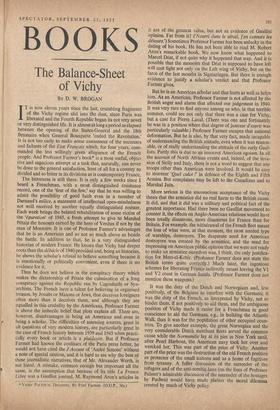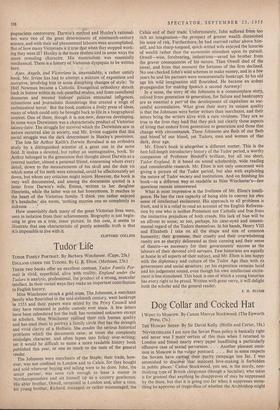BOOKS
The Balance-Sheet
of Vichy BY D. W. BROGAN IT is now eleven years since the last, crumbling fragments of the Vichy regime slid into the dust, since Paris was liberated and the Fourth Republic began its not very novel or very distinguished life. It is almost as long a period as elapsed between the opening of the States-General and the 18th Brumaire when General Bonaparte 'ended the Revolution.' It is not too early to make some assessment of the successes and failures of the Etat Francais which, for four years, com- manded the less willingly given allegiance of the French people. And Professor, Farmer's book* is a most useful, objec- tive and sagacious attempt at a task that, naturally, can never be done to the general satisfaction, least of all for a country so divided and so bitter in its divisions as is contemporary France.
The bitterness is still there. It is only a few weeks since I heard a Frenchman, with a most distinguished resistance record, one of the 'first of the few,' say that he was willing to admit the possibility of good faith even in a member of Darnand's milice. a statement of intellectual open-mindedness not well received by another equally distinguished resister. Each week brings the belated rehabilitation of some victim of the `epuration' of 1945, a fresh attempt to give to Marshal Pdtain the honours earned by the hero of Verdun if not by the man of Montoire. It is one of Professor Farmer's advantages that he is an American and so not so much above as beside the battle. In addition to that, he is a very distinguished historian of modern France. He knows that Vichy had deeper roots than the debacle of 1940 provided and, being an historian, he shows the scholar's refusal to believe something because it is emotionally or politically convenient, even if there is no evidence for it.
Thus he does not believe in the conspiracy theory which makes the dictatorship of Main the culmination of a long conspiracy against the Republic run by Cagoulards or Syn- ' archists. The French have a talent for believing in organised treason, by Jesuits or Masons or Jews, that deceives foreigners often more than it deceives them, and although they are equalled in this credulity by the Americans, Professor Farmer is above the imbecile belief that plots explain all. There are, however, disadvantages in being an American and even in being a scholar. The difficulties of assessing sources, great in all questions of very modern history, are particularly great in the case of. French history between 1939 and 1945 when practi- daily every book or article is a plaidoyer. But if Professor Farmer had known the coulisses of the Paris press better, he would not have cited the J'Accuse of 'Andre Simone' without a note of special caution, and it is hard to see why the best of these journalistic narratives, that of Mr. Alexander Werth, is not listed. A mistake, common enough but important all the same, is the assumption that because of its title La France Libre was a Gaullist journal. M. Raymond Aron's articles in * VICHY POLITICAL DILEMMA. By Paul Farmer. (O.U.P.. 30s.) it are of the greatest value. but not as evidence of Gaullist opinion. Far from it! (Wourri dans le serail, fen connais les detours.') Sometimes Professor Farmer has been unlucky in the dating of his book. He has not been able to read M. Robert Aron's remarkable book. We now know what happened to Marcel Mat, if not quite why it happened that way. And it is possible that the memoirs that Ddat is supposed to have left will cast light not only on the Left wing of Vichy. but on the farce of the last months in Sigmariugen. But there is enough evidence to justify a scholar's verdict and that Professor Farmer gives.
But he is an American scholar and that hurts as well as helps him. As an American,' Professor Farmer is not affected by the British anger and alarm that affected our judgement in 1940. It was very rare to find anyone among us who, in that terrible summer, could see not only that there was a case for Vichy, but a case for Pierre Laval. (There was one and fortunately he was in a position where that degree of justesse d'esprit was particularly valuable.) Professor Farmer escapes that national deformation. But he is also, by that very fact, made incapable of understanding the British attitude, even when it was reason- able, or of really understanding the attitude of the early Gaul- lists. Partly this is due to ap innocent American egoism. In all the account of North African events and, indeed. of the inva- sion of Sicily and Italy, there is not a word to suggest that any troops other than American were involved. It would be easy to murmur 'Quel culot P in defence of the Eighth and Fifth Armies. But complaints may be left to the Canadians and to Marshal Juin.
More serious is the unconscious acceptance of the Vichy thesis that the armistice did no real harm to the British cause. It did. and that it did was a military and political fact of the greatest importance. Had there been no Gaullist movement to counter it, the effects on Anglo-American relations would have been totally disastrous, more disastrous for France than. for Britain. For example, the withdrawal of the French fleet meant the loss of what were, at that moment, the most needed type of warships, destroyers. The desperate need for American destroyers was created by the armistice, and the need for impressing on American public opinion that we were not ready to make an armistice ourselves was, I think, the only justifica- tion for Mers-el-Kebir. (Professor Farmer does not state the British terms quite correctly.) Much later, the ingenious schemes for liberating France indirectly meant leaving the VI and V2 coast in German hands. (Professor Farmer does not mention these weapons.) It was the duty of the Dutch and Norwegians aud, less positively, of the Belgians to interfere with the Germans; it was the duty of the French, as interpreted by Vichy. not to hinder them, if not positively to aid them, and the ambiguous position of Vichy made it easier for a Frenchman in good conscience to aid the Germans, e.g., in building the Atlantic Wall, than it was for the population of other occupied coun- tries. To give another example, the great Norwegian and the very considerable Dutch merchant fleets served the common cause while the Normandie lay at its pier in New York until, after Pearl Harbour, the American navy took her over and wrecked her. This was part of the price of Vichy. Another part of the price was the destruction of the old French position as protector of the small nations and as a home of fugitives from tyranny. A fuller discussion of the surrender of the refugees and of the anti-semitic laws (on the lines of Professor Palmer's admirable discussion of the surrender of the hostages by Pucheu) would have made plainer the moral dilemma created by much of Vichy policy.
pugnacious controversy. Darwin's method and Huxley's rational- ism were two of the great determinants of nineteenth-century science, and with their aid phenomenal labours were accomplished. But of how many Victorians is it true that when they stopped work- ing they were ill? Huxley is the more restless and in some ways the more revealing character. His materialism was essentially mechanical. There is a history of Victorian dyspepsia to be written here.
Apes. Angels, and Victorians is, unavoidably, a rather untidy book. Mr. Irvine has had to attempt a mixture of exposition and narrative, involving him in some disturbing changes of style : 'In 1845 Newman became a Catholic. Evangelical orthodoxy shrank back in horror within its oak-panelled studies, and from castellated deaneries and moated bishops' palaces emanated inflwences, injunctions and journalistic thunderings that created a reign of ecclesiastical terror.' But the book contains a lively press of ideas, many of which could only be brought back to life in a biographical context. One of them, though it is not new, deserves developing. In some ways Darwinism was a characteristic product of Victorian laissez-faire. The struggle for survival which the Darwinists saw in nature occurred also in society, and Mr. Irvine suggests that this social struggle was the dark determinant in Huxley's pessimism.
The late Sir Arthur Keith's Darwin Revalued is an orthodox study by a distinguished scientist of a great one in the same field. It makes a devoted, but rather an unimaginative, book. Sir Arthur belonged to the generation that thought about Darwin as a revered teacher, almost a personal friend, concerning whom every detail, down to the measurements of his skull and the date on which some of his teeth were extracted, could be affectionately set down, but whom any criticism might injure. However, the book is very well documented, and among the documents quoted is a letter from Darwin's wife, Emma, written to her daughter Henrietta, while the latter was on her honeymoon. It reaches to the heart of the Victorian family. 'I think you rather enjoyed R's headache,' she wrote, 'nothing marries one so completely as sickness. . .
How unenviably dark many of the great Victorian lives were, seen in isolation from their achievements. Biography is just begin- ning to give us a true, inner picture. In this case, it seems to illustrate that one characteristic of purely scientific truth is that it is impossible to live with it.
CLIFFORD COLLINS

































 Previous page
Previous page